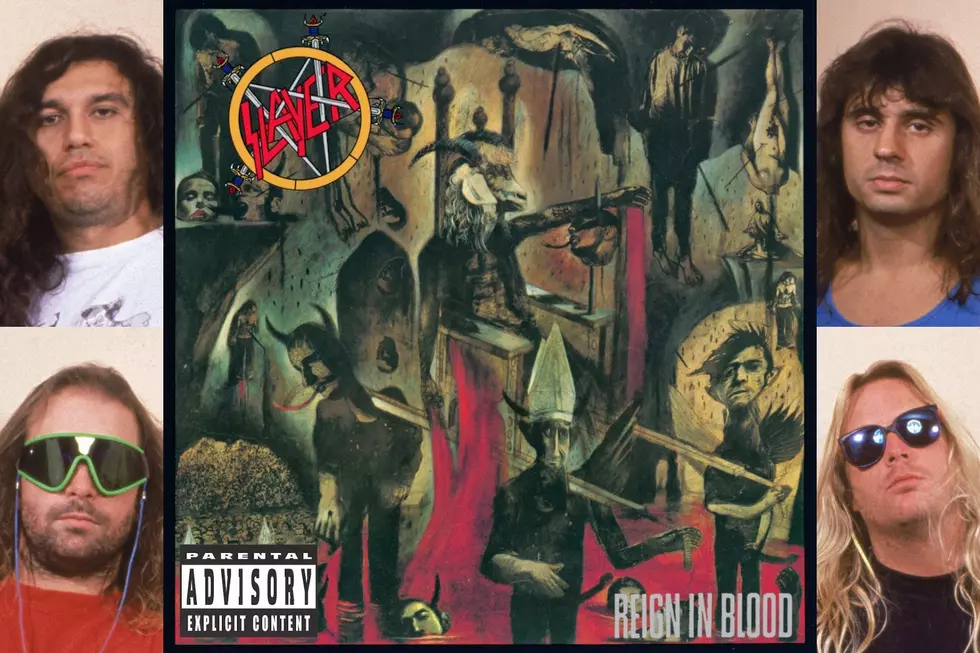
Slayer’s ‘Reign in Blood': Is It Really Their Best Album?
This week, Loudwire pays tribute to Slayer, who kick off their final tour on May 10 in San Diego. The thrash metal titans took the genre to faster, louder, and creepier places than anyone ever had, and they've influenced scores of extreme metal bands. From dissections of their songs and albums to never-before-told stories, we're celebrating all things Slayer.
~
1986's Reign in Blood is the quintessential Slayer album. Or is it? A roundtable of Loudwire writers debated that question, and -- without giving away anyone's ages -- we learned that those who were alive in '86 rate the album differently than those who weren't. In other words, if you felt the album's impact upon its release, it's impossible to separate that impact from how you feel about the album.
Is Reign in Blood still as impactful as it was when it was released in 1986?
Ed Rivadavia: No, but only because the world is now filled with countless albums created in Reign in Blood's image. You only get to be first once, and Reign in Blood was a first in so many ways. For those lucky enough to have been there, alive and headbanging, each Slayer release through Reign in Blood raised the bar for thrash metal beyond our wildest dreams, much as Metallica was doing until Master of Puppets, and that kind of impact simply can't be replicated after the ultimate molds have been made.
Graham Hartmann: No 30-year-old album is as impactful now as when it was released. An entire generation of bands has already come and gone since Reign in Blood, all trying to capture that same lightning in a bottle. Reign in Blood still kicks ass in 2018, but in 1986, it signaled the birth of a new subgenre: extreme metal. The only way to recreate that impact would be to lock your pop-music fan friends in a room and crank “Angel of Death” at full volume. Then you can watch the blood drain from their faces.
Joe DiVita: Is it still as impactful? Nope. Was I born by 1986? Nope. But when placing the album in the context of its release year, it's evident that nothing else matched the breakneck intensity of Reign in Blood whether it was the sinuous and surgical tandem guitar work, startlingly shocking and vivid lyrics or Dave Lombardo's combustion engine drumming — well, except for Kreator's Pleasure to Kill, but understandably Slayer had the name and the following while Kreator's stock was just about to rise. Given its linear approach to pure speed, the album's impact has undoubtedly waned in the modern age, skirting the line between thrash and its more extreme successor, death metal. The youth of today can pick up Cryptopsy's None So Vile and Reign in Blood and listen to them both for the first time and it's clear what's more extreme.
Jon Wiederhorn: Reign in Blood is just as relevant, perverse and important today as it was when it was first released. While it's not quite the fastest or most brutal thrash metal album of all time, it's the essential gateway album for fans discovering extreme music. Since it sold well, there have been lots of Slayer fans that have passed the album down to their younger siblings or even their kids. Tom Araya once told me that people come up to him all the time and say someone in their family was listening to some kind of loud music and then the older fan goes, "Dude you think that's heavy? Check this out." And then they give them Reign in Blood. From the opening blast of "Angel of Death" to the thunderstorm outro of "Raining Blood," the album is a relentless, sinister and concise assault that destroys and departs in under 30 minutes.
Katy Irizarry: It's funny: I was thinking, "I wasn't around in 1986, so I can't answer that question." However, after reminiscing about the first time I ever heard Reign in Blood, which was circa 2002, I imagine that the impression it had on me was no different than the impact it had on those very first listeners 16 years earlier. And now here we are, over three decades later, and kids are still picking that album up for the first time and having their lives changed. So yes, I'd say it is as impactful.
Without "Angel of Death" and "Raining Blood," would Reign in Blood still be held in such high esteem?
ER: Of course not, but then, other Slayer classic albums like South of Heaven and Seasons in the Abyss would likewise get brought down a few pegs without their signature tracks. And I still don't think any other Slayer LP — or thrash LP for that matter — can match the consistent quality and intensity of Reign in Blood. Ignore those mighty bookends, if you want, and every one of the remaining songs is either fantastic or incredible in its own right — they'd be highlights on most any other bands' albums.
JD: Sure, no album would be the same without its hits, but when coming away from a full album, the biggest impressions made are the first and last, which, here, means these two tracks respectively. "Piece by Piece," "Reborn" and all the others are fine, but they fall victim to the same stylistic trappings whereas other records like Seasons in the Abyss and Show No Mercy are more dynamic and offer more to the listener than the "more of the same" approach taken with the rest of Reign in Blood.
JW: It's not a fair question. Would Master of Puppets be so highly regarded without "Battery" and the title track? It would be an entirely different album. To that point, every good record has standout tracks. On Reign in Blood, the highlights happen to bookend the record, but the other eight shorter cuts are also brutal and well-crafted. "Criminally Insane," "Jesus Saves" and "Altar of Sacrifice" would sound amazing on practically any Slayer album and feature scream-along vocal lines as memorable as the best thrash hooks.
GH: The only difference between Slayer and Exodus is that Exodus never had an “Angel of Death” or “Raining Blood” in their catalog. Those two songs don’t just define the Reign in Blood album, they’re the reason Slayer can fill amphitheaters and arenas. 99 percent of Slayer fans got their first fix with either “Angel of Death” or “Raining Blood,” and there’s no going back once those songs scramble your brain. Either cut remains the most incredible jumping-off point to create a legion of superfans.
KI: Maybe not, but then again, what would those tracks have been replaced with? If, say, "South of Heaven," "War Ensemble," or "Spirit in Black" had made an appearance instead, the album could have held up just the same, if not better.
Is Reign in Blood Slayer's best album? If not, what is? If so, why does it crush the others?
ER: Without question. As good as they were, the next two albums (and the two before, forget the rest) were either busy falling just short of matching Reign in Blood, or trying desperately to find new avenues to roam, knowing that looking back was just too daunting. Yeah, yeah, all that jazz about Reign being the "most intense thirty minutes of metal ever recorded" may be a tired cliche today, but it was entirely justified in '86, as killer after killer song (zero filler, if you ask me) stormed past, with hardly a break in between, and even that became a Rick Rubin production trademark. In sum, other Slayer albums changed music, but Reign in Blood is one of those rare albums that changed lives.
JD: It isn't their best album. Is it their most intense? I won't argue against that, but intensity isn't everything. What's speed without some mid-tempo grooves a la Hell Awaits to temper it and show you what true explosiveness sounds like when it finally takes hold? In the name of transparency, I don't have a favorite Slayer record and have spent half my life internally battling between Show No Mercy (for my unrelenting — repentless? — NWOBHM heart), the Hell-ordained serpentine evil of Hell Awaits and the have-your-cake-and-eat-it-too balance of aggression and moodiness found on Seasons in the Abyss. That's right, I'll take three albums over Reign in Blood. Call me "Criminally Insane," I don't care.
JW: Reign in Blood is Slayer's best and most important record. It's fast, frenzied, infectious, filled with timeless riffs and as amped up as a hyperactive kid force-fed a pile of meth. The leap in quality from Hell Awaits to Reign in Blood is monumental and the timing of Reign in Blood was ideal. Slayer was the heaviest and most controversial metal band signed to a major label at the time the album came out and Slayer went into their deal with Def Jam/American Recordings with complete artistic control and pulled no punches. They launched the album with "Angel of Death," an inflammatory song about the horrific exploits of Josef Mengele and followed with songs about bodily dismemberment, serial murder, human sacrifice, rising from the dead, the apocalypse and the band's perspective on the hypocrisy of religion, subjects they would continue to address throughout their career. Finally, Larry Carroll's satanic cover art, which emulates the fieriest imagery of Hieronymous Bosch, is not only original, it's absolutely striking, encapsulating the blood, fire, and fury of the album within.
GH: Seasons in the Abyss is Slayer’s most cohesive and refined album. The fixation on speed on Reign in Blood can sometimes outpace the music’s character, while South of Heaven lacks that essential Slayer viciousness in certain parts of the album. Seasons finds a perfect balance between the two, encapsulating the very strongest dynamics of Slayer. I hold the unpopular opinion that “War Ensemble” is a better album opener than “Angel of Death,” and beyond that, Seasons shows absolutely no signs of weakness from beginning to end. Better riffs, better solos, better drumming, better hooks… it’s just a masterwork.
KI: No. Seasons in the Abyss is by far the best Slayer album. The overall tone is the darkest, heaviest, and most sinister of all the band's offerings. They lead with a track that rips right into a vicious cacophony of aggression, but then they close with a song that's lower and slower. And yet, despite the obvious change in tempo, both songs rival each other in heaviness. They deliver a mature variety of crushing power, perfecting their own signature sound. Every song on there is just perfect in its own way. This is not only the album that signifies when Slayer's evolution reached its pinnacle but is also the one to precede their imminent identity crisis.
Slayer Songs Ranked
13 Unforgettable Slayer Moments



